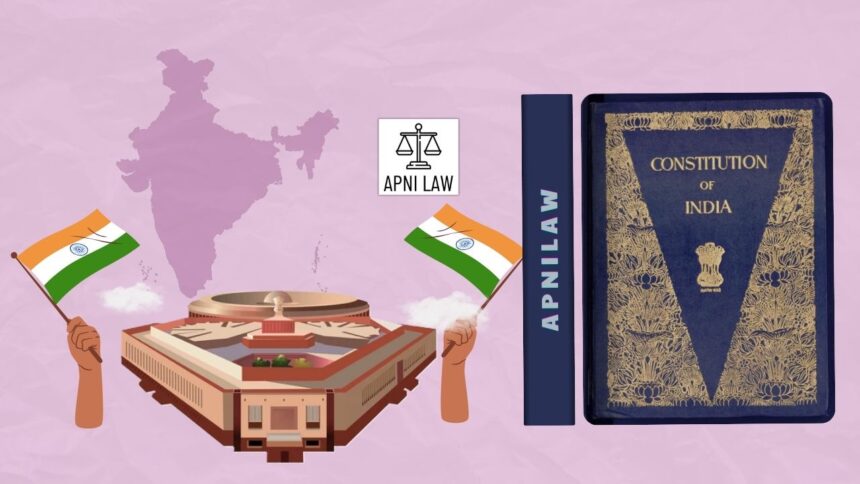What Is the Lok Sabha and Why Is It Important?
The Lok Sabha is the House of the People in India. It is the lower chamber of the Indian Parliament, but it holds the real power in law-making and government control. The Lok Sabha directly represents the people of India, so it plays a central role in shaping national policies. Its members come from every part of the country and speak for millions of citizens. The Lok Sabha functions as the voice of the people in the democratic system. It also acts as the main body that checks the work of the government. Because of its authority, the Lok Sabha is one of the strongest lower houses in any parliamentary democracy.
How Is the Lok Sabha Composed?
The Constitution sets the maximum strength of the Lok Sabha at 552 members. However, the present strength is 543 elected members. These members come from both States and Union Territories. Most members represent the States. A smaller number represent the Union Territories. Every member represents one territorial constituency. This means every area has one elected representative.
The members are directly elected by the people through the system of adult suffrage. Every citizen of India aged eighteen or above has the right to vote. The election follows the first-past-the-post system. The candidate with the highest number of votes wins the seat, even if the candidate does not secure more than half of the total votes.
Until 2020, the President of India could nominate two members of the Anglo-Indian community if the community was not adequately represented. The 104th Constitutional Amendment removed this provision. After this change, the Lok Sabha became a fully elected body without nominated Anglo-Indian members.
The term of the Lok Sabha is five years. It can be dissolved earlier by the President if required. When the Lok Sabha is dissolved, new elections take place across the country. Because the members are directly elected, the Lok Sabha keeps changing according to the will of the people.
What Powers Make the Lok Sabha Strong?
The Lok Sabha has the main power over financial matters. Money Bills can only be introduced in the Lok Sabha. The Rajya Sabha cannot make changes to a Money Bill. It can only suggest changes. The Lok Sabha can accept or reject the suggestions. Once the Lok Sabha passes a Money Bill, it becomes almost certain that the bill will turn into law.
The Lok Sabha holds the government accountable. The Council of Ministers stays in office only as long as it enjoys the confidence of the Lok Sabha. The government must answer every question raised in the House. If the members of the Lok Sabha pass a vote of no confidence, the government must resign. This gives the Lok Sabha the power to remove the executive at any time.
The Lok Sabha also has the authority to pass ordinary laws. The Rajya Sabha can delay such laws but cannot stop them permanently. If there is a disagreement between the two Houses, the President can call a joint sitting. In a joint sitting, the Lok Sabha has an advantage because it has more members. This makes its decision more likely to prevail.
The Lok Sabha also has the power to impeach the President of India for violation of the Constitution. Both Houses must participate in the impeachment. Still, the large number of Lok Sabha members gives it a vital role in this process. The Lok Sabha participates in the amendment of the Constitution as well. Constitutional Amendments require approval from both Houses.
What Legislative Functions Does the Lok Sabha Perform?
The Lok Sabha makes laws on subjects mentioned in the Union List. It also works with the Rajya Sabha to make laws on subjects in the Concurrent List. A bill can be introduced in the Lok Sabha, debated in detail, and passed after careful discussion. Members examine every clause and suggest changes when needed.
The legislative function is one of the most important duties of the Lok Sabha. Laws passed by the Lok Sabha affect the entire country. These laws guide government activity, regulate industries, protect rights, and manage public welfare. Because the Lok Sabha represents the people directly, its decisions reflect the needs and expectations of the citizens.
What Financial Role Does the Lok Sabha Have?
The Lok Sabha controls the finances of the country. The annual budget is first presented in the Lok Sabha. Members debate the budget in detail. They analyze the income, expenditure, and financial policies of the government. The government cannot spend money without the approval of the Lok Sabha.
Money Bills are the exclusive domain of the Lok Sabha. The Rajya Sabha cannot reject a Money Bill. This ensures that financial power stays firmly with the House of the People. Through this power, the Lok Sabha checks how the government earns money and how it spends it. This keeps the executive accountable and transparent.
How Does the Lok Sabha Control the Executive?
The Lok Sabha keeps a close watch on the functioning of the Council of Ministers. Ministers must answer every question asked during Question Hour. Members raise issues of public concern. They bring up matters that need government attention. The House debates policies and actions of the government.
Various motions allow the members to express disapproval. The most powerful among them is the vote of no confidence. If the majority of members vote against the government, the Council of Ministers must resign. This ensures that the government always acts responsibly. The executive stays in office only as long as it has support in the Lok Sabha.
What Electoral Functions Does the Lok Sabha Perform?
Members of the Lok Sabha participate in the election of the President of India. They also take part in the election of the Vice President. Their votes carry great importance because the Lok Sabha has more members than the Rajya Sabha. This gives the House a significant role in choosing the highest offices in the country.
What Judicial Powers Does the Lok Sabha Have?
The Lok Sabha has certain judicial functions. It takes part in the impeachment of the President. It can also remove officials like the Vice President and judges of the Supreme Court and High Courts under special procedures. These powers ensure that even the highest authorities can be held accountable if they violate the Constitution.
How Does the Lok Sabha Represent the People?
The Lok Sabha reflects the voice of the citizens. Every member speaks for a specific constituency. They discuss public issues, present grievances, and demand solutions. The House becomes the platform where the needs of the people reach the government. By representing public opinion, the Lok Sabha strengthens democracy.
What Is the Role of the Speaker in the Lok Sabha?
The Speaker presides over the sessions of the Lok Sabha. The Speaker maintains order in the House. The Speaker decides who may speak and ensures that debates run smoothly. The Speaker also certifies whether a bill is a Money Bill. This authority gives the Speaker a crucial position in parliamentary functioning. The Speaker remains impartial and protects the rights of both the ruling and opposition members.
For any specific query call at +91 – 8569843472
Conclusion
The Lok Sabha stands at the heart of India’s democratic system. It makes laws, controls the finances, checks the executive, and represents the people. Its members are chosen directly by the citizens. Therefore, the Lok Sabha carries the voice of the nation into the Parliament. It is the body that shapes the policies of the government and ensures accountability. Through its wide powers, the Lok Sabha plays a vital role in building and guiding the country.








